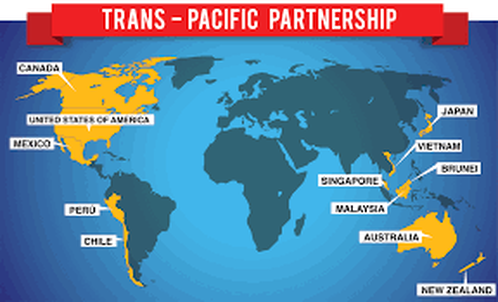1. Look at past Free Trade Deal: The 1994 North American Free Trade Agreement (NAFTA), the Economic Policy Institute (EPI) estimated that almost 700,000 US jobs had been lost as a direct result of the agreement. (In 1993, President Clinton claimed that NAFTA would create a million jobs in its first five years of operation.)
2. Countries involved in the TPP have long violated fundamental labor rights. The worst offender is Vietnam, whose government has refused to allow workers the freedom to form unions. Vietnam's senior advisor on international integration negotiations has stated in negotiations that Vietnam could "not accept [the right to establish unions] requirement." TPP countries have problematic labor records. In Mexico, violations of freedom of association are widespread, and child labor and forced labor are problems; in Malaysia, electronics and other goods are produced using child and forced labor, according to the US Department of Labor; in Peru, child and forced labor are commonplace; and in Brunei, which recently adopted Sharia law, the exploitation of foreign workers and discrimination against women are endemic. US workers should not face unfair competition from countries that systematically violate workers' rights, or lack the capacity to enforce their own laws or investigate violations. Unless these countries strengthen the protection of fundamental labor rights, corporations will likely shift more US jobs overseas under the TPP. 3. Workers in less developed countries have not benefitted from previous FTAs. Workers have seen conditions deteriorate further. The Colombian government has failed to curb widespread violence against union activists under the 2011 "Labor Action Plan" of the US-Colombia agreement. So far, 73 unionists have been murdered under the agreement. Labor abuses continue in Guatemala under the 2005 US-Dominican Republic Central America Free Trade Agreement (CAFTA-DR). As a result of the Guatemalan government's failure to effectively enforce its own labor laws in more than 400 instances, the Office of the US Trade Representative initiated the first-ever labor dispute through a FTA in September 2014 - a complaint that was first filed six years ago. “Fast track” is precarious lacking Congressional processes and parallel construction of trade deals in the best interests of Americans who rely on elected Congressional oversight as a complement to the executive branch of government. The overarching question is should voters trust that labor standards in this kind of deal will conform to the International Labor Organization’s Declaration on Fundamental Principles and Rights At Work guaranteeing freedom of association, the right to collective bargaining, the abolition of child labor and forced, slave labor as well as human trafficking, and the elimination of discrimination in employment, and strengthen and streamline enforcement mechanisms? To expect the TPP, as it is loosely and clandestinely defined right now, will in essence build cohesion and uniformity among member nations by “trickle down” from corporations without intense oversight and enforcement of standards Americans have had for years is a long shot at best. “Fast track” is not the way to ensure thoroughly negotiated standards, fairness and the preeminence of civil and human rights for both Americans and, indeed, foreign workers. TPP negotiations should be conducted in public, transparent, and approval incumbent upon Congressional powers to participate in the process invested in them by the American people, including amendments and filibuster. Yes, it makes the process longer and gaining consensus more laborious. But in the final analysis a trade deal—if it is deemed beneficial for all—would be a product of and by the American people. There is room for fair and open negotiations where unanimity is the goal, not merely expediency. Correction: According to a story by Ralph Nader in the Huffington Post, fast track allows for 20 hours of debate in each house of Congress. Resources http://america.aljazeera.com/articles/2015/5/14/senate-cuts-deal-on-tpp-fast-track-vote.html http://www.truth-out.org/opinion/item/28976-five-reasons-congress-should-oppose-the-tpp http://www.cnn.com/2002/ALLPOLITICS/07/27/bush.trade.bill/index.html http://robertreich.org/post/107257859130
4 Comments
eileen
2/6/2015 12:18:42 pm
Interesting to read an American perspective on this deal.
Reply
Dava Castillo
3/6/2015 02:38:32 pm
Thanks for reading and commenting Eileen.
Reply
eileen
3/6/2015 11:59:53 pm
Whenever our goverment looks at fast tracking any legislation it is invariably bad news for we the little people
Dava Castillo
11/6/2015 11:18:49 am
Eileen,
Reply
Leave a Reply. |
Dava Castillo
is retired and lives in Clearlake, California. She has three grown
children and one grandson and a Bachelor’s degree in Health Services
Administration from St. Mary’s College in Moraga California. On the
home front Dava enjoys time with her family, reading, gardening, cooking
and sewing. Archives
November 2015
|


